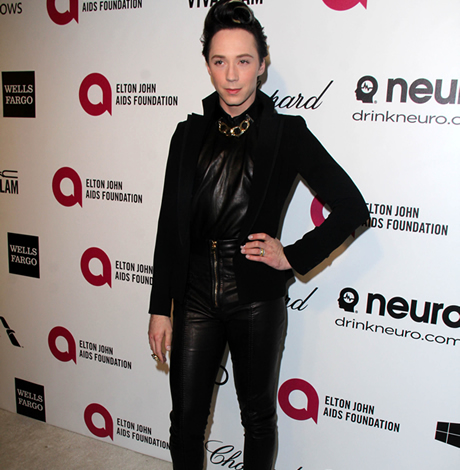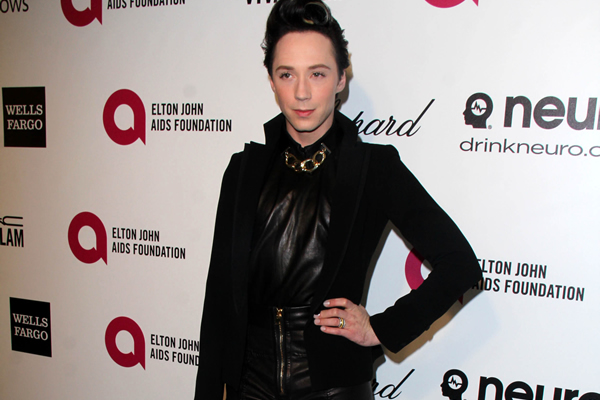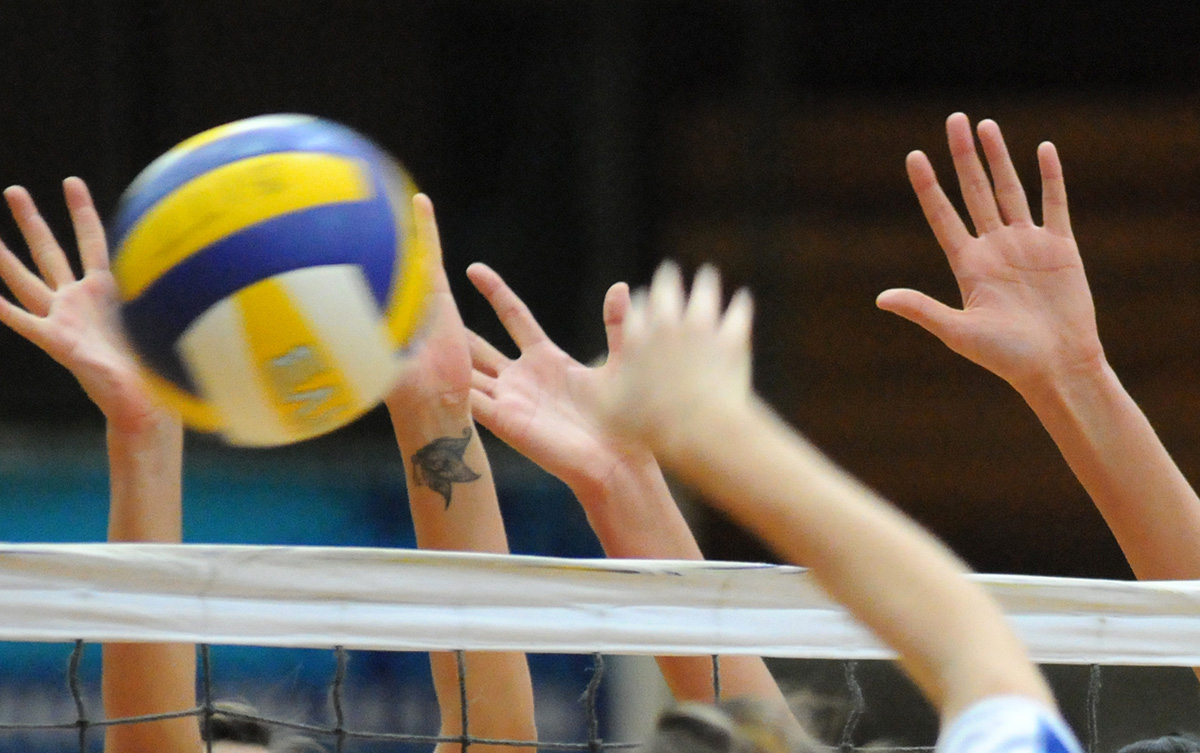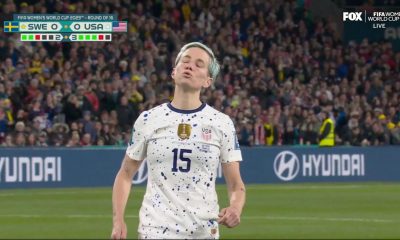Sports
Branding, marketing a complicated issue for out athletes
Changing demographics among millennials bode well for endorsements, sponsorships


‘Being the absolute truest brand of myself has been the greatest career asset I’ve had,’ said figure skater Johnny Weir. (Photo by kathclick; courtesy Bigstock)
Just 16 years old, Johnny Weir was already one of the world’s top international figure skaters. The sport was a lucrative business and Weir’s talent amassed attention from agencies worldwide.
“The first agency that approached me said, ‘We really want you, but you can’t be gay if we represent you,'” Weir says. “I hadn’t even come out to my mother.”
Sports marketing is a $70-plus billion industry and one in which gay athletes are still finding their footing with balancing their personal brand and their sexuality. But it wasn’t long ago that being out wasn’t widely accepted by the sports community or its stakeholders.
“When we won the World Cup in 1999, the networks were very curious about where I was running to celebrate,” says recent National Soccer Hall of Fame inductee Briana Scurry. “The cameras followed me. But when they realized it was to my girlfriend, they cut away.”
Presentation and representation of an athlete dictates the career. In most cases the majority of an athlete’s lifetime earnings and social impacts come by way of sponsorships and marketing opportunities so branding is the most important game many athletes will ever play. But it’s not simple. And for gay athletes, finding an identity that appeals to teammates, fans and sponsors alike is an even more complex facet of the business.
Though agencies and corporations weren’t always open to partnering with gay athletes, augmented acceptance has alleviated constraints on their opportunities within the industry. “Demographics have changed,” says Hudson Taylor, founder of Athlete Ally. “Younger generations are very accepting. Sponsors and agencies have seen both internal backing and increased support from consumers.”
Now, 18 years since Briana Scurry and Johnny Weir were penalized for their sexual orientation, it’s one of the key aspects considered when developing an athlete’s personal brand.
Dan Levy, a senior vice president with sports marketing firm Wasserman suggests, “People get excited when athletes come out, so players feel pressure to present their orientation publicly. It’s a piece of the puzzle; it’s a variable you have to take into consideration when trying to create opportunities.”
But there’s still no clear-cut approach to branding for the gay athlete. As restraints faded with mounting cultural approval, new challenges emerged. No longer fixated on the industry’s consent, gay athletes must consider the degree to which they represent and champion their sexual orientation through their branding.
“Abby [Wambach] felt really strongly that true progress was not having to come out and talk about it publicly,” says Levy.
Wambach, whose first public confirmation of her sexual orientation was her 2013 marriage, told the Associated Press, “I never felt like I was in a closet. I’ve never been asked a question about my relationship — rightfully so, because it shouldn’t matter.”
Laina Cohn, partner at Cohn Torgan Management and representative for Johnny Weir suggests that not every athlete is equipped to lead the charge. “Johnny wasn’t an activist, he was an athlete. His whole world was about getting on the ice and winning. He never stepped onto the ice because he was gay.”
Some athletes view their branding as a responsibility. Joanna Lohman, one of the National Women’s Soccer League’s most outspoken advocates, embraces the position. “I am admired for being out and proud. I realize how special it is to be viewed that way — it’s why I take advocating so seriously. It’s important for me to use the platform and brand that I have as a professional athlete to elevate the community.”
Similarly, Megan Rapinoe utilized her visibility and personal brand to represent the LGBT community after inking a healthy deal with Nike. “Megan was the first athlete I really dug in with on a coming out,” Levy says. “She felt really strongly after the World Cup that she wanted people to see that there are a lot of gay athletes out there.” Rapinoe in 2014 served as guest editor of the Washington Blade’s Sports Issue.
But it’s a different world for men, a view shared by many.
“There’s a lot of social pressure on the male side,” Lohman submits. “It’s not a very supportive environment. There are labels and stigmas associated with being a gay man in sports, so you just don’t see that represented very often. On the women’s side it’s much more accepted, if not assumed.”
Scurry says that hesitation on the part of male athletes stems from existing in a different culture. “For female athletes now, it doesn’t seem to hinder them. But with male athletes, it’s different. There are a lot of male athletes that have chosen not to come out until after their career was over.”
Biases against gay males have been integrated into the actual structure of sports perpetuating stereotypes and suppressing awareness. “Sport is a gendered space, an institution that teaches masculinity and femininity and it does so in a very binary way,” Taylor says. “That masculinity is often wrongly reinforced with homophobic language.”
But representatives like Cohn are optimistic. “I hope things change. I hope that by having stories told, by sharing experiences through television and social media the culture will eventually be different.”
Levy recognizes the shift in the acceptability of promoting gay athletes. “It mirrors our culture and what has changed. The progress we’ve made as a society is showing up in the world of sports. Maybe it’s at a different pace, but progress has been made.”
Briana Scurry sees a new landscape for the gay athlete’s public persona.
“There’s a huge difference in athlete presentation now,” she says. “One of the most memorable moments of the 2015 World Cup was Abby running to her partner after the final match. Nobody looked away. Eighteen years since the camera swung away from me, it stayed right on them. It’s a clear differentiator between how gay athletes could present their brands and themselves then and now.”
For Weir, presenting himself authentically was empowering.
“I could’ve signed with that first agency at 16 years old and completely whitewashed myself. But I would have been boring. I would have never had the career I’ve had. I stuck to my guns and we created this brand and my agency, they support me as a human being. … Being the absolute truest brand of myself has been the greatest career asset I’ve had.”

FIFA has announced Saudi Arabia will host the 2034 World Cup, despite concerns over its human rights record that includes the death penalty for homosexuality.
The Associated Press reported FIFA confirmed the decision on Dec. 18. The AP noted Saudi Arabia is the only country that bid to host the 2034 World Cup.
“This is a historic moment for Saudi Arabia and a dream come true for all our 32 million people who simply love the game,” said Sport Minister Prince Abdulaziz bin Turki Al- Faisal, who is also president of the Saudi Olympic and Paralympic Committee, in a statement the Saudi Press Agency posted to its website.
Saudi Arabia is among the handful of countries in which consensual same-sex sexual relations remain punishable by death.
A U.S. intelligence report concluded Saudi Crown Prince Mohammed bin Salman “likely approved” the murder of Jamal Khashoggi, a Washington Post columnist, inside the Saudi Consulate in Istanbul in 2018. A federal judge in 2022 dismissed a lawsuit against Prince Mohammed after the Biden-Harris administration said he was immune to the lawsuit because he is the country’s prime minister.
Human rights activists have also criticized the Saudi government over the treatment of women, migrant workers, and other groups in the country.
“No one should be surprised by this,” Cyd Zeigler, Jr., co-founder of Outsports.com, an LGBTQ sports website, told the Washington Blade in an email after FIFA confirmed Saudi Arabia will host the 2034 World Cup. “FIFA, the International Olympic Committee, and many other world governing bodies routinely turn to authoritarian countries with terrible human-rights records to host major sporting events. There are simply few other countries willing to spend the billions of dollars it takes to build the needed infrastructure.”
Peter Tatchell, a long-time LGBTQ activist from the U.K. who is director of the Peter Tatchell Foundation, in a statement described FIFA’s decision as “a betrayal of the values that football should stand for: Inclusivity, fairness, and respect for human rights.”
“This is not about football; it’s about sportswashing,” said Tatchell. “The Saudi regime is using the World Cup to launder its international image and distract from its brutal abuses. By granting them this platform, FIFA is complicit in whitewashing their crimes.”
Qatar, which borders Saudi Arabia, hosted the 2022 World Cup.
Consensual same-sex sexual relations remain criminalized in Qatar.
“Saudi Arabia was the only country to bid for the 2034 FIFA World Cup,” said Zeigler. “So, until FIFA, the IOC (International Olympic Committee) and other governing bodies ban major human-rights violators from hosting, we’ll continue to see events like this in Saudi Arabia, China, Qatar, and other countries with terrible LGBTQ rights issues.”
The Blade has reached out to FIFA and the Saudi government for comment.
Sports
Controversy grows over member of Calif. university’s women’s volleyball team
Coach suspended, NCAA sued, more rivals forfeit

San Jose State University’s women volleyball team has collected yet another W by forfeit — its seventh so far this season — as controversy swirls around one player on its roster. She’s one of the seniors, and she has been dragged in the media by her own co-captain, who outed her as transgender.
The Washington Blade is not naming this student athlete since neither she nor the school have confirmed or even commented on her gender identity.
SJSU visited San Diego last weekend for a match before the Aztecs’ biggest home crowd of the season — including protesters waving “Save Women’s Sports” banners and booing one player on the Spartans team in particular: The woman who is reported to be trans.
Security was tight, with metal detectors and extra guards and police officers present. Video posted to YouTube by a right-wing sports media site — which names the player — shows an angry fan arguing with security about his First Amendment rights.
Video recorded during Nov. 9’s game shows a player for San Diego was injured following a spike by the player rumored to be trans, and had to be helped off the court. However, the video clearly shows that player was injured by landing poorly on one foot, not as a result of the spike.
The Aztecs defeated the Spartans 3-1, but San Jose has still punched its ticket to the conference finals, thanks to its record number of forfeits.
Wyoming was set to visit SJSU Thursday, but for the second time is joining other universities that have forfeited games against the Spartans, all without providing a reason. Boise State announced it will forfeit an upcoming match set for Nov. 21, its second forfeit against SJSU.
In September, the Spartans’ co-captain, senior Brooke Slusser, outed her own teammate, the player at the center of this controversy, in joining a federal lawsuit against the NCAA spearheaded by anti-trans inclusion activist and former college athlete Riley Gaines.
Slusser said in the lawsuit and in subsequent interviews that the player in question shouldn’t be on her team. The suit claims the NCAA’s policy on trans athletes violates Title IX by allowing “men” to compete in women’s sports and use women’s locker rooms where they display “full male genitalia.”
The NCAA policy for trans athletes participating in women’s volleyball aligns with that of USA Volleyball, which requires trans female athletes to suppress their testosterone below 10 nmol/L for a period of one year before competition. That is also how the NCAA determines eligibility. SJSU has stated repeatedly that all its players are eligible.
The lawsuit also asks the NCAA to revoke any titles or records won by trans female athletes in women’s competitions, which seems to be specifically aimed at stripping out trans NCAA champions Lia Thomas and CeCé Telfer of their titles in swimming and track and field, respectively.
Prior to this season, the player rumored to be trans did not attract any attention other than being a successful starter, like Slusser. But now that she is in the media spotlight, Slusser has come forward to tell right wing media, including Megyn Kelly, why she feels another woman two inches taller than she is poses a danger.
“I don’t feel safe,” Slusser said on “The Megyn Kelly Show” last month. “I’ve gone to my coaches and said I refuse to play against [her] … It’s not safe.”
In the video, both Kelly and Slusser refer to the player as “him” and a “man,” and name her.
Now comes another twist: San Jose State University suspended associate head coach Melissa Batie-Smoose with pay, indefinitely, after she filed a Title IX complaint against SJSU. She claims the player Slusser identified as trans conspired with an opponent to help the team lose a match and injure Slusser. Batie-Smoose named the player in question in her complaint and on Sept. 23, joined the same lawsuit that Slusser is now a part of.
“Safety is being taken away from women,” Batie-Smoose told Fox News. “Fair play is taken away from women. We need more and more people to do this and fight this fight because women’s sports, as we know it right now will be forever changed.”
Media reporting on the suspension, including Fox News, continue to name the athlete in question, with some also reporting what they say is the athlete’s birth name.
San Jose State released a statement following the suspension of Batie-Smoose: “The associate head coach of the San Jose State University women’s volleyball team is not with the team at this time, and we will not provide further information on this matter,” the team said.
SJSU Coach Todd Kress told ESPN that reports saying that any member of the Spartans colluded with their opponent are “littered with lies.”
The Spartans are currently among the top six finishers in the Mountain West Conference that will qualify to compete in the conference tournament scheduled for Nov. 27-30.
Sports
University of Nevada forfeits game rather than play possible trans athlete
Women’s volleyball team cites ‘not enough players to compete’

For the fifth time, a women’s volleyball team has chosen to forfeit instead of play against San Jose State University, because of rumors that one of its players is a transgender woman.
The University of Nevada, Reno, officially announced on Friday that it would forfeit Saturday’s game against the SJSU Spartans. This followed an announcement by Wolf Pack players who said they “refuse to participate in any match that advances injustice against female athletes,” without providing further details.
Originally, Nevada’s athletic department had said the program would not back out from the match, citing state equality laws, but also said that no players would be disciplined if they chose to not participate.
“The vast majority of our team decided this is something we wanted to take a stand on,” Nevada team captain Sia Liilii told Fox News. “We didn’t want to play against a male player.”
“In all of our team meetings it just kept coming back to the fact that men do not belong in women’s sports. If you’re born a biological male, you don’t belong in women’s sports. It’s not even about this individual athlete. It’s about fair competition and safety for everyone.”
Outsports and several conservative and right-wing websites have identified the player who is rumored to be trans, but the Washington Blade has opted to not do so since she herself has not come forward to either acknowledge or deny she is trans.
As ESPN reported, Nevada follows Southern Utah, Boise State, Wyoming, and Utah State in canceling games against the Spartans. Boise State, Wyoming, Utah State, and Nevada are all members of the Mountain West Conference, so those contests are considered forfeits and count as valuable wins in the league standings for San Jose State.
Riley Gaines, the anti-trans inclusion activist for the Independent Women’s Forum has joined the chorus in claiming the Spartans’ roster includes a trans woman.
If you're wondering why teams are forfeiting against @SJSU, here's the reason.
Last night another woman was smashed in the face by a kill from a man posing as a woman.
It's unfair, unsafe, and regressive, yet our "leaders" remain silent. pic.twitter.com/OS15AFxQsp
— Riley Gaines (@Riley_Gaines_) October 18, 2024
Despite this, neither San Jose State nor any of the other forfeiting teams have said the university’s women’s volleyball team has a trans player. SJSU issued a statement defending its roster.
“Our athletes all comply with NCAA and Mountain West Conference policies and they are eligible to play under the rules of those organizations. We will continue to take measures to prioritize the health and safety of our students while they pursue their earned opportunities to compete,” the statement read.
The governors of Idaho, Nevada, Utah, and Wyoming — all of whom are members of the Republican Party — have issued public statements supporting the cancellations, claiming it’s in the interest of fairness in women’s sports. This week, Donald Trump, the GOP presidential nominee and former president, spoke at a Fox News televised town hall when asked about trans athletes in women’s sports.
“We’re not going to let it happen,” Trump said. “We stop it, we stop it, we absolutely stop it. We can’t have it. You just ban it. The president bans it. You don’t let it happen. It’s not a big deal.”
-

 District of Columbia5 days ago
District of Columbia5 days agoFinal push to raise funds, fill D.C. hotels as WorldPride nears
-

 El Salvador3 days ago
El Salvador3 days agoGay Venezuelan makeup artist remains in El Salvador mega prison
-

 District of Columbia4 days ago
District of Columbia4 days agoReenactment of 1965 gay rights protest at White House set for April 17
-

 Maryland5 days ago
Maryland5 days agoFreeState Justice: Transgender activist ‘hijacked’ Moore’s Transgender Day of Visibility event












